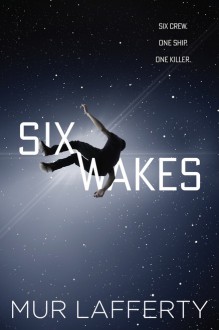Every month, I go to a book club that meets at a local taproom. Rather than reading a specific book, each month has a theme. May's theme was the Nebula Awards because, well, they are awarded in May. The Nebulas are one of those awards I've always been vaguely aware of from stickers on books, though I do enjoy Ceridwen's Blogging the Nebulas posts. I was a bit surprised to see how many previous nominees I'd read. I had to cull down to just a handful of recommendations.
Here's what I ended up bringing from this year's ballot:
Six Wakes - Mur Lafferty. I wanted to read something on topic for the month, so I compared this year's Nebula and Hugo nominees. The overlap included Six Wakes, which I hadn't read yet, and is published by Orbit. The Hugo voter packet includes whatever publishers provide, and Orbit has traditionally included excerpts of nominees, not full books. Strategery! Turns out, I liked it quite a bit.
The Strange Case of the Alchemist's Daughter - Theodora Goss. I read this one last year, and abso-fucking-lutly loved it. Great characters in an interesting concept, and there's a sequel out really soon. I was so happy to see it on an awards ballot. I won an auction for a signed copy that arrived a day before our May meeting.
I also decided, like I had when our theme was the Hugos, to bring some of my favorite losers. The awards hadn't been announced when we met, so I didn't even know my first two picks had lost. I would have brought Stone Sky, but I've rec'd to this group before. But here are some real losers:
A Stranger in Olondria - Sofia Samatar. I adored this beautifully written fantasy novel about a book nerd's misadventures. The not-sequel is also amazing. Samatar's prose is just wonderful. My copy of this was signed here in Alabama, at a lecture she was giving MFA students in Tuscaloosa. Because if a master of the genre is going to make an appearance in my state, I can be a little late to work the next morning. Oh, since I'm late posting this, I can link to her recent AMA. This book lost to Ancillary Justice in 2014. But it did win a World Fantasy Award, a British Fantasy Award, and a Crawford Award. Samatar also won the Campbell Award for best new writer. Her blog has since become private, so I can't link to her post about the WFA, but more on that in the next book.
Who Fears Death - Nnedi Okorafor. My copy of this is technically a gift for my niece. I got it signed at Worldcon in Chicago. She's almost old enough to read it. This is a different indictment/celebration of fantasy than Samatar's, but no less powerful or wonderfully written. It lost to Blackout/All Clear in 2011, and I can't even. It did win a Kindred, and a World Fantasy Award that year, sparking an essay that eventually resulted in a redesign of the award statue 5 years later.
China Mountain Zhang - Maureen F. McHugh. I read this so long ago I don't have a review for it. It combines a vast scope with a well done character study. McHugh has done a lot of outstanding work, and this is no exception. This lost to Doomsday Book in 1993, but won a Lambda, Locus, and Tiptree.
Lord of Light - Roger Zelazny. This is one of those books that starts off firmly a fantasy, but reveals itself as science fiction, and the author is a poet. One of my favorite books. My current not for load copy is the leather bound Eaton Press edition. In addition to being a piece of goddamned art, this book was the cheesy sci-fi novel used as cover for the Canadian Caper, aka, the CIA operation in Argo. It lost to The Einstein Intersection in 1968, but won a Hugo that year.
All Flesh is Grass - Clifford D. Simak. Simak wrote at least three versions of alien invasions that followed roughly the same plot. This is the best one. A small town finds itself cut off from the outside world and some purple flowers are revealed to be extraterrestrials. Creepy and weird, it's worth a read if you're visiting that era of scifi. It lost to Dune in 1966, making it one of the first losers.
Next month's theme is Urban Fantasy.

 Log in with Facebook
Log in with Facebook 





















